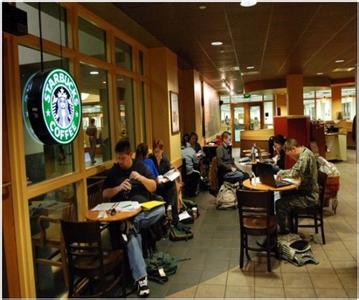Foreign coffee chains are growing rapidly in China and are becoming diversified.
According to the Financial Times, many foreign brands and business models have met their Waterloo in China, from Best Buy to B & Q. However, the Western retail concept, foreign coffee shops, which was perhaps the least likely to succeed, has flourished in China.

Despite thousands of years of tea drinking in China, coffee chains from the United States, Britain and South Korea have been able to expand rapidly in China. Sales in these coffee shops are growing faster than almost all retail businesses in mainland China. Sales of coffee chains more than doubled last year from less than 10 billion yuan ($1.6 billion) in 2008 and are expected to double again by 2017, according to Euromonitor.
Several retail analysts say Starbucks, an American coffee chain, has essentially built a contemporary coffee culture in China from scratch. By contrast, they point out, tea is not only the most popular drink in China, but also deeply rooted in Chinese culture.
Since opening its first store in mainland China in 1999, Starbucks has positioned its store as a fashionable place to meet friends and get close to the Western lifestyle. Through this positioning, Starbucks has become one of the most famous lifestyle brands in mainland China. Starbucks' huge popularity has even changed the taste buds of Chinese people, and China's consumption of freshly brewed coffee is also increasing.
As the market continues to expand, it also continues to diversify. In the past few years, niche Korean cafes have sprung up like bamboo shoots after a spring rain, and independent coffee shops can be seen everywhere in big cities. In addition, from McDonald's and KFC to convenience store brands in Japan and Taiwan, all stores have begun to promote freshly brewed coffee.
Last year, CCTV, China's official broadcaster, launched a fierce attack on Starbucks' overpricing on the mainland. However, Starbucks not only shrugged off the impact of that attack, but also accelerated its expansion. Earlier this month, Starbucks said it planned to double the number of its stores to more than 3000 by 2019.
Costa Coffee also plans to double its stores in China to 700 by 2018, according to Esteban Liang, managing director of Asia. Kashijia Coffee is a coffee chain controlled by Whitbread. In addition, Maan Coffee has also said it intends to expand its number of stores in mainland China from the current 100 to 200 by the end of 2015. Man Coffee is a popular restaurant chain, which started in South Korea and has the characteristics of both cafe and leisure.
Esther Lau, retail analyst at Mintel, said: "predictably, South Korea, the United States, the United Kingdom, as well as local coffee chains and fashionable independent cafes." It will lead to a great degree of diversification in the market, which will consolidate the large-scale growth of the market. "
UBC is one of the first Taiwanese coffee chains to enter mainland China. The company's Frank Yin says that the more coffee shops there are now, the more coffee shops are likely to open in the future. "the more coffee shops appear, the more people are familiar with coffee," he said. "
However, in terms of market share, while Starbucks is growing rapidly, Shangdao Coffee is one of the biggest losers. From 2008 to 2013, Starbucks' market share in China increased from 12% to 31%, while Shangdao Coffee's share fell from 33% to 22%, according to Euromonitor.
At the same time, McDonald's, which had little share, has opened 800 in-store McCafe's restaurants, expanding its market share to 6 per cent. During the same period, Kashijia's share increased from 1% to 5.5%. Until recently, most of Yum's KFC outlets in mainland China did not serve coffee. Recently, however, the company has also begun to promote coffee. Today, the company also sells freshly brewed coffee in convenience stores in many first-tier cities.
Torsten Stocker, Greater China retail partner at AT Kearney, said: "of course, competition is also intensifying. However, in my opinion, even the density of coffee shops in Shanghai cannot be compared with that of Japan and South Korea. "
On a recent cold weekday afternoon, the 374 seats in a coffee shop on the outskirts of Shanghai were filled with people, mainly friends who were chatting loudly in groups. At the same time, the Starbucks in a nearby office building is almost full, with customers dominated by individuals who work on laptops or talk to colleagues.
What is even more surprising is that more and more mainlanders are not just patronizing coffee shops, they are also buying coffee drinks instead of non-coffee drinks that used to be more popular.
Speaking of sweet cream instant coffee, which is popular among emerging coffee drinkers in mainland China, Mr Tang said: "even compared with five years ago, people's ability to appreciate the flavor of coffee is greatly improved. Five years ago, for most people, coffee was Nestl é three in one. "
Mintel's Esther Lau said that given that the average consumption of coffee per person in mainland China is only four cups a year, there is still a lot of room for coffee sales to grow.
Important Notice :
前街咖啡 FrontStreet Coffee has moved to new addredd:
FrontStreet Coffee Address: 315,Donghua East Road,GuangZhou
Tel:020 38364473
- Prev

Running a cafe that sells 100 cups of coffee a day doesn't make a loss?
In recent years, coffee culture has gradually sprung up in Rongcheng, and the number of Rongcheng cafes is also growing rapidly, and now it has reached nearly 1000. Although the number of cafes continues to grow, Ye Zefan, president of the Fujian Coffee Industry Association, admitted to the reporter KuaiBao in Southeast China that at present, nearly 70% of the cafes in Rongcheng are in a state of loss, and many cafes have changed hands because they cannot continue to operate.
- Next

Yunnan coffee harvest season may exceed 120000 tons this year.
From January 23 to 25, the 4th China Mangshi (International) Coffee Culture Festival will be held in Dehong City. During the Cultural Festival, the first Yunnan Coffee Trade Fair will be held, the first China Cafe growth Forum will be held, and thousands of people will perform "Kiss Chu" coffee in the past life and this life. According to the person in charge of the Yunnan Curry Association, up to now, the planting area of coffee in Yunnan has exceeded 1.6 million mu.
Related
- Unexpected! Ruixing Telunsu lattes use a smoothie machine to foam milk?!
- % Arabia's first store in Henan opens into the village?! Netizen: Thought it was P's
- Does an authentic standard mocha coffee recipe use chocolate sauce or powder? Mocha Latte/Dirty Coffee/Salty Mocha Coffee Recipe Share!
- What is the difference between Vietnam egg coffee and Norway egg coffee? Hand-brewed single product coffee filter paper filter cloth filter flat solution!
- What is the difference between sun-cured and honey-treated coffee? What are the differences in the flavor characteristics of sun-honey coffee?
- How to make Italian latte! How much milk does a standard latte use/what should the ratio of coffee to milk be?
- How to make butter American/butter latte/butter Dirty coffee? Is hand-brewed coffee good with butter?
- Is Dirty the cold version of Australian White? What is the difference between dirty coffee/decent coffee and Australian white espresso?
- Relationship between brewing time and coffee extraction parameters How to make the brewing time fall to 2 minutes?
- Got entangled?! Lucky opens a new store, Mixue Ice City, and pursues it as a neighbor!

